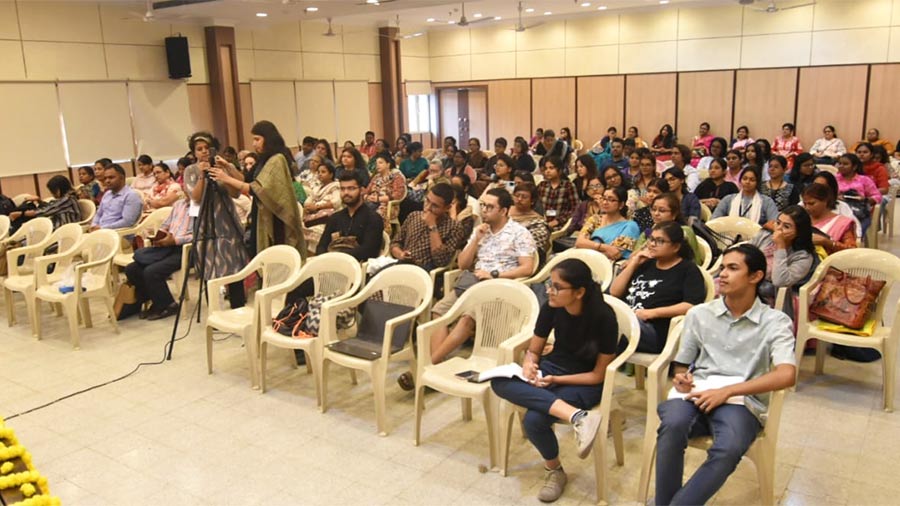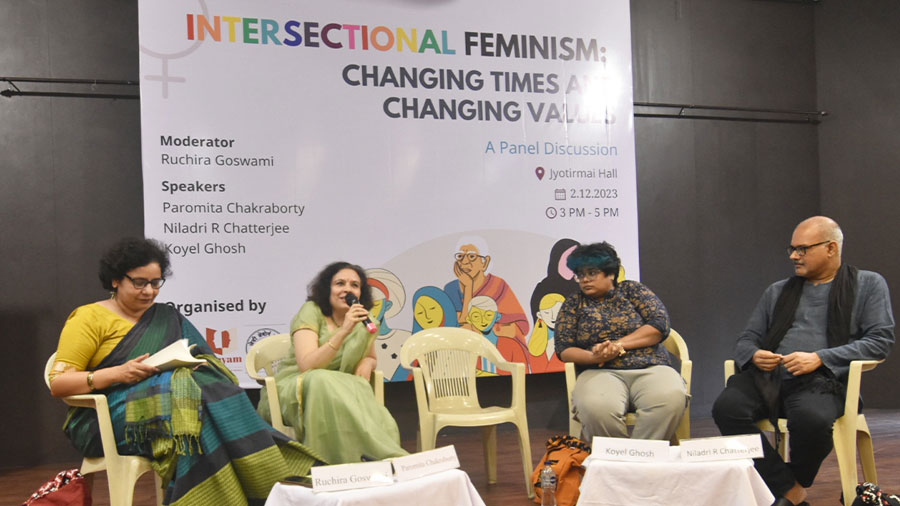What is intersectional feminism? How is feminism in India different today from what it used to be? What does it mean to be a feminist? How can more men be brought into conversations about feminism? These were some of the questions raised and answered at a panel discussion on Intersectional Feminism: Changing Times and Changing Values conducted by Swayam at Jyotirmai Hall, Kolkata, on December 2.
The panel featured scholars and activists from Kolkata — Paromita Chakravarti, professor of English at Jadavpur University; Niladri R. Chatterjee, professor of English at University of Kalyani; and Koyel Ghosh, managing trustee of Sappho for Equality.
The three speakers and moderator Ruchira Goswami spoke about issues faced by women and the different ideas surrounding feminism, concluding how there is no single definition of feminism or what it means to be a feminist.
Chakravarti spoke about the early years of feminism in India and how the HIV pandemic brought about mass awareness and a certain rise to feminism at a time when it wasn’t taught or talked about. She said most colleges now have a course on gender studies in some form and that there has been a generational change in the meaning of feminism and feminist. “There was a time when we didn't know or speak about feminism because we had a certain privilege and perceived life a certain way. From there we have now come to a point where the younger generation is actively speaking about feminism and gender inequality and they are taught these concepts through the gauge of history just proves that feminism is an ever evolving concept that cannot be narrowed down,” said the former director of Women’s Studies at Jadavpur.

The audience raised questions about the laws on sexual assault and violence Ashim Paul
Ghosh, a gender-non-conforming, non-binary queer feminist activist, spoke about women being questioned on how feminist they are and that to understand what it is to be a feminist one had to unlearn everything that had been taught to be able to perceive a certain issue in a different light. Citing the example of a girl being forced into a marriage and someone having the power to prevent it, she said: “Often, people would say ‘I have saved this girl’ but you should look at the same situation and think ‘I have only helped the girl get what is her basic right and that doesn’t make me a saviour but much rather an enabler’.”
Chatterjee shared his insights on problems that stem from upbringing and some basic habits parents incorporate in their children. “If there is a sanitary pad commercial on television, someone would quietly get up from the sofa to perform a task that has no urgency just to avoid addressing the issue. They would much rather watch movies with violence and enjoy talking about the fight scenes in Hindi movies than watch an ad that promotes basic hygiene,” said the scholar who has been looked down upon for being a man who actively talks about gender equality and gender studies. He also touched upon the fact that the lack of conversations at home around sex and violence can be a major issue because a child will then fall into the same system rather than question what is right and what it not “For us Indians, we don’t talk about sex at home and none of our parents has had sex, I know for certain my parents would not have had sex, I was delivered to my mother’s lap when the stork came,” quipped the author of Entering the Maze: Queer Fiction of Krishnagopal Mallick.
The audience raised questions about the laws on sexual assault and violence and whether they need to be more gender-specific. Other questions revolved around feminism defining what a woman should be or the basic definition of what is a man or what is a woman came across to the panel who then engaged in further conversation with the audience.
